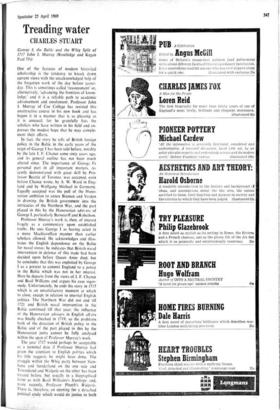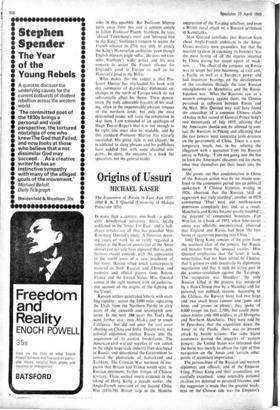Treading water
CHARLES STUART
One of the features of modern historical scholarship is the tendency to knock down current views with the unacknowledged help of the forgotten work of the day before yester- day. This is sometimes called 'reassessment' or, alternatively, 'advancing the frontiers of know- ledge,' and it is a reliable path to academic advancement and emolument. Professor John J. Murray of Coe College has resisted this unattractive course in his new book and has begun it in a manner that is as pleasing as it is unusual; for he gratefully lists the scholars who have written in his field and ex- presses the modest hope that he may comple- ment their efforts.
In fact, the story he tells of British foreign policy in the Baltic in the early years of the reign of George I has been told before, notably by the late J. F. Chance some sixty years ago, and its general outline has not been much altered since. The importance of George l's personal part in all important matters, re- cently demonstrated with great skill by Pro- fessor Beattie Of Toronto, was accepted, even before Chance wrote, by A. W. Ward in Eng- land and by Wolfgang Michael in Germany. Equally accepted was the pull of the Hano- verian ambition to annex Bremen and Verden in drawing the British government into the intricacies of the Northern War, and the part played in this by the Hanoverian advisers of George I, particularly Bernstorff and Robethon.
Professor Murray's work is, then, of interest largely as a commentary upon established truths. He sees George I as having acted in a more Machiavellian manner than earlier Scholars allowed. He acknowledges and illus- trates the English dependence on the Baltic for naval stores; he indicates that British naval intervention in defence of this trade had been decided upon before Queen Anne died; but he concludes that this was exploited by George I as a pretext to commit England to a policy in the Baltic which was not in her interest. Here he departs from the views of J. F. Chance and Basil Williams and argues his case vigor- ously. Unfortunately, he ends his story in 1717 which is an unsatisfactory moment at which to close, except in relation to internal English politics. The Northern War did not end till 1721 and British naval intervention in the Baltic continued till that year; the influence of the Hanoverian advisers in English affairs was finally checked in 1719; so the problems both of the direction of British policy in the Baltic and of the part played in this by the Hanoverian junta cannot be fully analysed within the span of Professor Murray's work.
The year 1717 would perhaps be acceptable as a terminal date if Professor Murray had given the attention to English politics which his title suggests he might have done. The struggle within the Whig party between Stan- hope and Sunderland on the one side and Townshend and Walpole on the other has been treated before, but usually in a biographical form as with Basil Williams's Stanhope and, more recently, Professor Plumb's Walpole. There is, therefore, an opening for a detached political study which would do justice to both sides in this squabble. But Professor Murray turns away from this and is content simply to follow Professor Plumb. Stanhope, he says, `abused Townshend's trust' and `betrayed him to the King'; Stanhope's concern to secure the French alliance in 1716 was only to gratify the King's Hanoverian ambitions 'even though English interests might suffer.' He does not con- sider Stanhope's wider policy and his wise concern to secure the French alliance for England's good in Europe as well as for Hanover's good in the Baltic.
What makes this the sadder is that Pro- fessor Murray has overloaded his book with dry summaries of day-to-day diplomatic ex- changes in the north of Europe which do not substantially affect his theme. These demon- strate the truly admirable breadth of his read- ing, often in the impenetrably obscure tongues of the northern lands, but only the most determined reader will resist the temptation to skip them. I am reminded of an apothegm of Hugh Trevor-Roper's that it is not enough to be right, one must also be readable, and by this standard Professor Murray has scarcely succeeded. HiS prose style is not elegant; he is addicted to slang phrases and his publishers have saddled him with some dreadful mis- prints. In short, the outcome is a book for specialists, not the general reader.











































 Previous page
Previous page